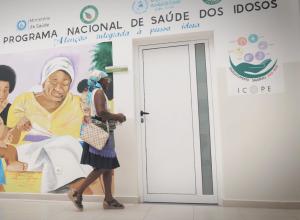Cabo Verde invests in improving the quality of care for the elderly
Ana Rita's life has improved since she started attending regular appointments at the local health unit in Assomada, on the island of Santiago.
She is returning to normal life after a stroke she suffered during the covid-19 pandemic and is benefiting significantly from the country's efforts to improve care for the elderly.
“I feel welcomed at this center, where we have our own room and the attention and care we receive here has a big impact on our health,” says Ana Rita.
Cape Verde's health and socio-economic progress in recent decades has had a significant and positive impact on life expectancy, which in 2020 was 75 years old. This has been increasing consistently over the last few decades, bringing with it challenges for the health system.
The population aged over 60 is increasing - from 7.6% in 2010 to 10.0% in 2021. This population represents a growing proportion of the burden of Non-Communicable Diseases (NCDs), which cause around 60% of all deaths in the country.
The strategic plan for active ageing and the health of older people, horizon 2024-2028, aims to improve the health and well-being of older people by preventing, protecting and reducing dependency on care and promoting dignity of life, with community involvement, strengthening the capacities of the workforce and legislative and regulatory improvements.
“The leadership of WHO Cabo Verde has been fundamental in the implementation of the ICOPE strategy, through technical support in the adaptation and adoption of the guidelines and the development and updating of policies and plans aimed at integrated and continuous care throughout life,” says Edith Pereira, acting head of WHO Cabo Verde
Since the beginning of 2022, experts from the World Health Organization at headquarters and the regional office have been working with the Ministry of Health to develop this strategy based on evidence and needs to improve the health and well-being of the country's elderly.
